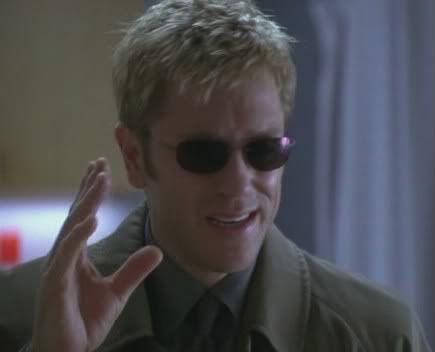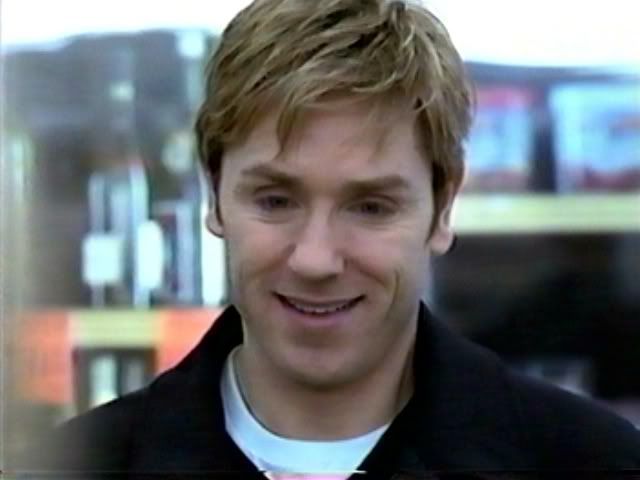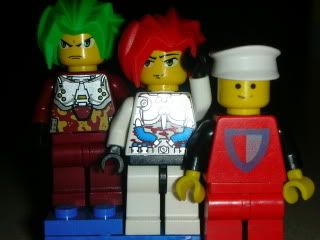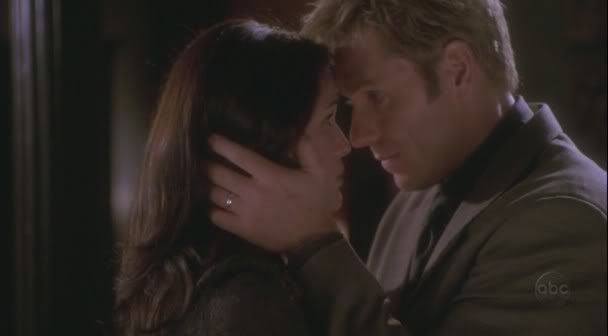Post by maggiethecat on Nov 8, 2005 21:59:56 GMT -5
Got it! Thank heavens Zap2it decidd to archive the article instead of pitching it. Here's the full text, and it was about Christie being hated by the audience. I've highlighted that part in Bold. And I have to say, the things that Eldard has to say about the character really are fascinating. Hey, he liked Angsty Jim, too!
LOS ANGELES (Zap2it.com) "Blind Justice" has a ridiculous premise. But on the other hand, having a ridiculous premise does not always keep a show from being successful. Steven Bochco ("L.A. Law," "NYPD Blue") parlayed the silly idea of a 16-year-old doctor into a hit with "Doogie Howser, M.D.," but the risky concept of combining police drama with musical numbers proved a tougher sell in his short-lived "Cop Rock."
Now he's at it again in ABC's "Blind Justice," which premieres in the old "NYPD Blue" slot on Tuesday, March 8. Bochco co-created the show with "Blue" veterans Nicholas Wootton and Matt Olmstead.
"Blind Justice" asks viewers to believe that an NYPD detective blinded in the line of duty can then return to active duty, with both a guide dog and a loaded gun. Ron Eldard plays Detective John Dunbar, with Marisol Nichols as his reluctant partner, Karen Bettancourt. Also starting are Reno Wilson, Frank Grillo and Michael Gaston.
"When I met Steven," Eldard recalls, "I didn't know him, and he didn't have a script yet. When he told me the idea, I thought, 'I'll give you credit, it's a ballsy idea. But before we get into the metaphor, before we get into whether it's artsy or not, let's just deal with what everyone's going to say, which is, 'That's ridiculous. This cannot happen. There have been days when we've been working, where there'll be some big discussion over some specific wording of some police thing, and I'll say, 'We can't possibly be having this conversation much longer. I'm a blind man with a gun.'"
In making him a believer, Eldard gives credit to Gary Fleder ("Runaway Jury," "Impostor") who directed the pilot and a few early episodes.
"I'm a harsh critic," Eldard says. "But the way that Gary Fleder pieced the pilot together, it didn't hang me up. I didn't get hung up on the gun."
"As a practical matter," Bochco says, "this is a fiction. We made it up. What we tried to do in promoting that concept was to build into the pilot and in subsequent episodes the legitimate skepticism that I think both the audience and fellow cops would initially have when faced with a situation where they have to work with and/or partner with a cop who is so handicapped.
"By creating, within the body of the pilot and the show itself, that kind of skepticism, it gives the audience permission to go with the concept. Once you go with the concept, and you see the way in which we have characterized this guy and really embraced the pain, both emotionally and physically, of having to go through this kind of transition, it becomes very credible."
Allowing all that for the moment, there are still a couple other sketchy moments in the version of the pilot provided to critics, of which Eldard is very aware. Fleder occasionally uses visuals to illustrate how Dunbar might see the world in his mind's eye, and it works. But during a confrontation in which Dunbar has to pull his gun, there are flashes of red light that almost make it look as if Dunbar may not be completely blind.
"You know what?" Eldard says. "This is actually a point of contention for me. It was not written that way. Originally that scene, where I have the gun, there is nothing. The guy leans for the gun, clicks his heel, and that's it. My answer for you is, I don't know what that [light] is. I don't agree with it. It's something that I hope we work through. It makes everyone think he can see a little bit. Really, they have to stop this."
"That particular effect," Bochco says, "none of us is 100 percent happy with it, and we're still messing with it. But in the fullness of the episode, I think it's pretty clear that he's legitimately blind."
In addition, Dunbar seems to have the stock TV-cop relationship with his wife, Christie (Rena Sofer), which is to say the marriage is in trouble. She saw him through his illness, but his former infidelity and current attitude are driving her away.
"That might be one of the biggest pleasant surprises in doing the thing," Eldard says. "Rena did the best she could in the pilot. The character's written a certain way. I said to them, 'Is the wife out soon? Is that what's going to happen?'
"But there's something we left out of the pilot, that they shot, that would have given you a very different picture. It's coming up later. I said, 'If you do this, I'm telling you right now, all audiences are going to hate her guts. They're going to hate her, and they're going to dump her, because that's ridiculous. Stop it.' And they didn't do it."
According to Eldard, Sofer also contributed to the development of Christie.
"Rena's big complaint was, 'Why did I pick this guy? There's a part of me that digs that he's a rough guy, so let's not have me complain about everything. I don't want him to stop doing everything; I don't want him to cheat on me anymore.'
"How often do you see a young couple married that's actually trying to make it work? They love each other; they're still sexy to each other. Where do you ever see that? You don't. There's great drama in fighting the fight. They've been showing a commitment to that, because Rena refused to play that note over and over."
Eldard also wasn't interested in playing a man suddenly ennobled by his handicap.
"He doesn't have to be a great guy. He doesn't have to be noble. He hasn't changed that much, but he's trying.
"He might be noble, he might not be. But he's a good cop; let's see what he is."
LOS ANGELES (Zap2it.com) "Blind Justice" has a ridiculous premise. But on the other hand, having a ridiculous premise does not always keep a show from being successful. Steven Bochco ("L.A. Law," "NYPD Blue") parlayed the silly idea of a 16-year-old doctor into a hit with "Doogie Howser, M.D.," but the risky concept of combining police drama with musical numbers proved a tougher sell in his short-lived "Cop Rock."
Now he's at it again in ABC's "Blind Justice," which premieres in the old "NYPD Blue" slot on Tuesday, March 8. Bochco co-created the show with "Blue" veterans Nicholas Wootton and Matt Olmstead.
"Blind Justice" asks viewers to believe that an NYPD detective blinded in the line of duty can then return to active duty, with both a guide dog and a loaded gun. Ron Eldard plays Detective John Dunbar, with Marisol Nichols as his reluctant partner, Karen Bettancourt. Also starting are Reno Wilson, Frank Grillo and Michael Gaston.
"When I met Steven," Eldard recalls, "I didn't know him, and he didn't have a script yet. When he told me the idea, I thought, 'I'll give you credit, it's a ballsy idea. But before we get into the metaphor, before we get into whether it's artsy or not, let's just deal with what everyone's going to say, which is, 'That's ridiculous. This cannot happen. There have been days when we've been working, where there'll be some big discussion over some specific wording of some police thing, and I'll say, 'We can't possibly be having this conversation much longer. I'm a blind man with a gun.'"
In making him a believer, Eldard gives credit to Gary Fleder ("Runaway Jury," "Impostor") who directed the pilot and a few early episodes.
"I'm a harsh critic," Eldard says. "But the way that Gary Fleder pieced the pilot together, it didn't hang me up. I didn't get hung up on the gun."
"As a practical matter," Bochco says, "this is a fiction. We made it up. What we tried to do in promoting that concept was to build into the pilot and in subsequent episodes the legitimate skepticism that I think both the audience and fellow cops would initially have when faced with a situation where they have to work with and/or partner with a cop who is so handicapped.
"By creating, within the body of the pilot and the show itself, that kind of skepticism, it gives the audience permission to go with the concept. Once you go with the concept, and you see the way in which we have characterized this guy and really embraced the pain, both emotionally and physically, of having to go through this kind of transition, it becomes very credible."
Allowing all that for the moment, there are still a couple other sketchy moments in the version of the pilot provided to critics, of which Eldard is very aware. Fleder occasionally uses visuals to illustrate how Dunbar might see the world in his mind's eye, and it works. But during a confrontation in which Dunbar has to pull his gun, there are flashes of red light that almost make it look as if Dunbar may not be completely blind.
"You know what?" Eldard says. "This is actually a point of contention for me. It was not written that way. Originally that scene, where I have the gun, there is nothing. The guy leans for the gun, clicks his heel, and that's it. My answer for you is, I don't know what that [light] is. I don't agree with it. It's something that I hope we work through. It makes everyone think he can see a little bit. Really, they have to stop this."
"That particular effect," Bochco says, "none of us is 100 percent happy with it, and we're still messing with it. But in the fullness of the episode, I think it's pretty clear that he's legitimately blind."
In addition, Dunbar seems to have the stock TV-cop relationship with his wife, Christie (Rena Sofer), which is to say the marriage is in trouble. She saw him through his illness, but his former infidelity and current attitude are driving her away.
"That might be one of the biggest pleasant surprises in doing the thing," Eldard says. "Rena did the best she could in the pilot. The character's written a certain way. I said to them, 'Is the wife out soon? Is that what's going to happen?'
"But there's something we left out of the pilot, that they shot, that would have given you a very different picture. It's coming up later. I said, 'If you do this, I'm telling you right now, all audiences are going to hate her guts. They're going to hate her, and they're going to dump her, because that's ridiculous. Stop it.' And they didn't do it."
According to Eldard, Sofer also contributed to the development of Christie.
"Rena's big complaint was, 'Why did I pick this guy? There's a part of me that digs that he's a rough guy, so let's not have me complain about everything. I don't want him to stop doing everything; I don't want him to cheat on me anymore.'
"How often do you see a young couple married that's actually trying to make it work? They love each other; they're still sexy to each other. Where do you ever see that? You don't. There's great drama in fighting the fight. They've been showing a commitment to that, because Rena refused to play that note over and over."
Eldard also wasn't interested in playing a man suddenly ennobled by his handicap.
"He doesn't have to be a great guy. He doesn't have to be noble. He hasn't changed that much, but he's trying.
"He might be noble, he might not be. But he's a good cop; let's see what he is."













